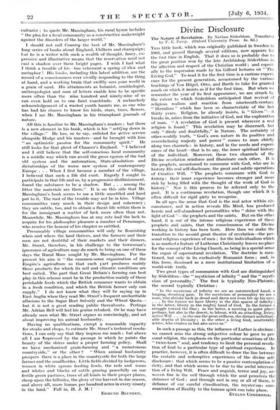Divine Disclosure
Trus little book, which was originally published in Sweden in 1003, and passed through several editions, now appears for the first time in English. That it does so is probably due to the great position won by the late, Archbishop Sfiderblom in the affection and respect of the Christian world ; and especi- ally to the impression made by. his Gifford lectures on " The Living God." To read it for the first time is a curious experi- ence for the present generation, accustomed by the various teachings of Von Hugel, Otto, and Barth to take for granted much on which it insists as if for the first time. But when we remember the year of its first appearance, we are struck by the extent to which Soderblom anticipated that revival of religious realism and reaction from nineteenth-century " liberalism " which has been so characteristic of the last thirty years. Religion, he already insists, is " Given "—it breaks in, arises from the initiative of God, not the exploration of man. " A revelation of God is present wherever a real religion is found." This revelation may be discerned, but only " dimly and doubtfully," in Nature. The certainty of other-worldly truth, " God's own nature in its positive and overwhelming majesty and power " comes to man chiefly along two channels : in history, and in the needs and experi- ences of the heart—that is to say, the inner spiritual history of the individual. Moreover, these two channels of the Divine revelation reinforce and illuminate each other. It is the prophets, accustomed to commune with God, who see in history His real self-disclosure, the great and subtle operations of Creative Will. " The prophets commune with God in history : their inner experience becomes stronger and more rich by being filled with the thought of the work of God in history." Nor is this process to be referred only to the past. It is a continuous revelation, though one which it is often difficult for rigid piety to recognize.
In all ages the sense that God is the real actor within cir- cumstance, and in action reveals His Mind, has produced heroic and self-abandoned personalities who " shine with the light of God "—the prophets and the saints. But on the other hand, it is out of the intense religious experience of these prophets and saints, that the consciousness of the Divine working in history has been born. Here then we make the transition to the second great theatre of revelation—the per- sonal religious experience of men ; for the individualism which is so marked a feature of Lutheran Christianity leaves no place for the concept of the Living Church, as being in a special sense the organ of supernatural revelation. The doctrine is men- tioned, but only in its exclusively Romanist form ; and, in this form, dismissed as a mere institutional limitation of a world-wide truth.
Two great types of communion with God are distinguished by Soderblom—the " mysticism of infinity " and the " mysti- cism of personality." The first is typically Neo-Platonic, the second typically Christian :
" In the mysticism of infinity we see an outstretched hand, a longing, dreaming gaze. In the mysticism of personality we see a man, who shrinks back in dread and dares not even lift up his eyes. . . . In the former we have liberty in the dim spaces of infinity ; in the latter, liberty in the mighty hand of God. In the former a struggle toward the One ; in the latter, a meeting in quiet places perhaps, but also in the desert, in labour, with an attacking, living, active Will . . . in the one the great stillness, the distant unfathom- able depths of Divinity ; • in the other a living God, unutterably active, who crushes us but also saves us."
In such a passage as this, the influence of Luther is obvious ; we cannot miss the strong subjective colour he gave to per- sonal religion, the emphasis on the particular sensations of the " twice-born " soul, and tendency to limit the personal revela- tion of God to a particular type of spiritual experience. In practice, however, it is often difficult to draw the line between the ecstatic and redemptive experiences of the divine self- disclosure : that which seems to be a passive contemplation of deity, and that which seems to be due to the awful interven- tion of a living Will. Peace and anguish, terror and joy, are woven fine in the veil through which the soul perceives the shimmer of God ; and through and in any or all of them, in • defiance of our careful classification, the myster:ou3 com- munication of Reality to the human spirit can take place. EVELYN'UrrnEann.L.










































 Previous page
Previous page